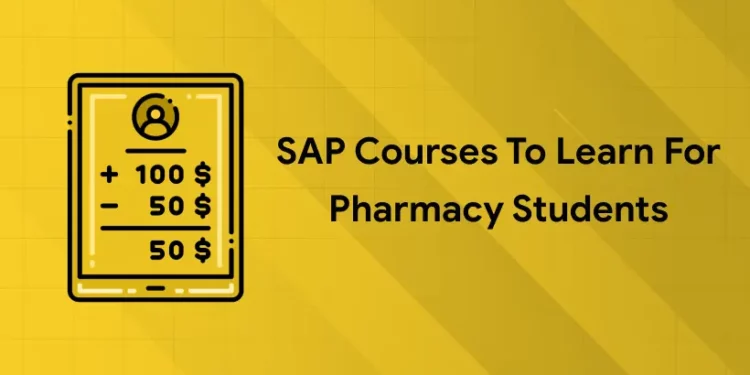Table of Contents
The pharmaceutical industry has seen significant growth in terms of research and development. However, this industry has occasionally encountered countless difficulties. These include a highly dispersed distribution network, a distinct lack of sophisticated infrastructure, high operating costs, and a variety of safety rules and stringent policies during both manufacturing and distribution. This sector requires workable and reasonably priced strategies to address these market obstacles. Furthermore, you can only manage complexity, adhere to regulations, cut expenses, and boost productivity by developing innovative solutions. But how can this be accomplished? This is where SAP comes into play. Let us look at some of the Best SAP Course for Pharmacy Students.
Want to learn the SAP SD module? Click here to join the Entri Elevate SAP SD online course now!
Best SAP Course for Pharmacy Students: Introduction
Software programs known as enterprise resource planning (ERP) systems give businesses greater control and visibility over their operations in real-time. The market offers a variety of ERP software, including SAP S/4, Acumatica ERP Cloud, Oracle ERP Cloud, Oracle NetSuite ERP, BizAutomation, and HANA. Among these, SAP ERP software is utilized in several industries. This includes the oil and gas sector and the process industries, which include the pharmaceutical and chemical sectors. The System Analysis Program (SAP) is investing heavily and continuously in research and development to dominate the ERP market further.
SAP (Systemanalyse Programmentwicklung) set up the industry standard for enterprise resource planning (ERP) software. A modular business management and automation tool, SAP is used to streamline processes and increase productivity. SAP enables a wide range of businesses to standardize their data management across the board, in contrast to the past practice of businesses decentralizing their operational data and storing materials and sales information in distinct databases. The rapid advancements in information technology, especially in hardware, software, and SAP solution providers, have a significant impact on how businesses view, access, and manage their data.
SAP would only be implemented or upgraded for business-related reasons, like increasing competitiveness, cutting costs, integrating data, offering customers excellent customer service, enhancing decision-making skills, standardizing resource planning, and facilitating efficient application processing.
The pharmaceutical sector in India is expanding rapidly. In 2014, it experienced double-digit growth, with over 10,000 manufacturing facilities and nearly 3,000 pharmaceutical companies. One of the top six producers in the world is the Indian pharmaceutical sector. Even though the national government is taking several steps to boost exports soon, the lack of technology implementation is negatively affecting the growth of the pharmaceutical market globally. Indian pharmaceutical exports are approaching $25 billion.
SAP Courses to Learn for Pharmacy Students
Although there are many software providers with fresh and creative solutions on the market, SAP is the best option to stay up to date with the times to succeed in the market and prosper. It is believed that the key to gaining international market share is the quick use of cutting-edge technology. Numerous pharmaceutical companies have adopted a cutting-edge SAP-based pharmaceutical manufacturing system that includes intrinsically safe RF computers and electronic signatures for production confirmations and quality approvals. So, it is important to learn SAP skills if you want to thrive in the pharmaceutical industry.
Master SAP with Expert-Led Courses
Unlock your potential with our comprehensive SAP courses! Learn essential modules like SAP MM (Materials Management), SAP SD (Sales and Distribution), and SAP FICO (Financial Accounting and Controlling) from industry experts.
Know MoreWhy Pharmacy Students Should Learn SAP?
A company can manage finances, human resources, materials and procurement management, production planning, sales and distribution, and many other corporate services with SAP’s all-inclusive solution. It unifies every department and function within an organization into a single database that can meet the needs of each department by allowing all functionalities to access and share common data. This condensed sentence is not enough to make you fully understand the uses of SAP in pharmaceutical companies. So, let us discuss the benefits of learning the Best SAP Course for Pharmacy Students.
Coordination of Manufacturing
Planning, scheduling, procurement, production, shipping, and inventory can all be managed by pharmaceutical manufacturing companies using SAP in a single system. In addition to reducing redundancy, automating procedures, and improving operations, SAP helps companies streamline and optimize their entire supply chain.
Staying Compliant and Making Progress
Compliance is one of the most important success factors for top pharmaceutical companies. All these pharmaceutical companies now must abide by a wide range of rules enforced by different organizations, including the FDA, DEA, and EPA. They are therefore looking for more effective ways to handle and account for the growing number of rules and regulations. SAP can help with this. SAP provides a wide range of adaptable options to help businesses stay compliant and advance, from payment methods to field sales, laboratory operation management, and compliant manufacturing and equipment manufacturing.
Finding and Resolving Issues
Large volumes of data present a constant challenge for pharmaceutical companies. And what does this result in? It acts as a deterrent to narrowing down the potential issues. Furthermore, this makes it very challenging for organizations to maintain product integrity and guarantee product safety. Businesses can obtain all the information they require with the aid of SAP Solutions and the integrated approach it offers. This enables them to promptly identify issues relevant to raw materials, supplies, manufacturing, quality control, and packaging.
Efficient and Simple Business Strategy Implementation
The majority of pharmaceutical companies are showing signs of a shift away from their R&D-centered business model and toward a dual-focus model that contributes significantly to the remarkable increase in sales. This is an effort to find various market opportunities. This step now necessitates a thorough understanding of the market and all its facets, including preserving connections, expanding market share, finding qualified doctors, and boosting sales effectiveness. Businesses can utilize SAP’s CRM (Customer Relationship Management) technology to conduct market research, run multichannel campaigns, collaborate with doctors, and gain market share.
Cutting Down on Delays
One crucial point to remember is that pharmaceutical companies have a significant time difference between the launch of their products and their peak sales. And it is necessary to minimize this disparity. And why? It is crucial since businesses face significant drops in revenue and lose the ability to patent their flagship products. Businesses must make sure that their sales operations are carried out efficiently and on schedule because there is a significant risk of negative cash flow. SAP now offers a multitude of incredible and effective tools that aid in reducing significant time gaps and, consequently, delays. Contract management, enhancing campaign performance and management, and promptly identifying and balancing chargebacks and rebate volumes are among the tools.
Taking Advantage of New Prospects for Outsourcing
Pharmaceutical companies often believe that their core processes are too complicated to survive outsourcing when it comes to working on cost savings. However, it’s crucial to note that the number of competent and rapidly expanding IT support firms available to assist with domestic and offshore outsourcing is substantial. All businesses need to know is how to seize these opportunities.
Businesses benefit greatly from the SAP NetWeaver in this process. It assists businesses in seizing a range of opportunities. It provides hosting services like application and implementation hosting, which aid businesses in expanding their operations and guarantee a seamless transition. Consequently, this facilitates successful outsourcing regardless of time zone and location.
Management of Inventory
Any business, but particularly those that manufacture pharmaceuticals, need inventory. Supply chain transparency is made possible by SAP systems, which let businesses follow inventory as it travels through the supply chain. Even with stringent tracking requirements, SAP systems can also automatically generate comprehensive reports, provide accurate counts, analyze inventory flow, conduct quality checks, facilitate planning, and deliver a host of other tools to make inventory management easier.
Product Tracking and Tracing Made Simple
Accidents and trustworthiness are the two things that directly contribute to the establishment of a company’s reputation, whether it be favourable or unfavourable. Paper-based tracking procedures are undoubtedly ineffective in today’s market for product tracking. RFID technology is the most effective in this situation. A ready-made RFID platform that can be quickly deployed and integrated with essential supply chain and ERP procedures is offered by SAP Auto-ID Infrastructure, a component of SAP NetWeaver. As a result, this helps businesses maintain a positive public image by giving them new, beneficial functionalities to track and monitor products and avoid accidents.
Learn SAP SD from the best mentors in the industry! Join Entri Elevate now itself!
Recommended SAP Modules for Pharmacy Students
SAP modules like Production Planning (PP), Materials Management (MM), and Sales and Distribution (SD) are essential to the pharmaceutical industry’s seamless operations and adherence to regulations. These modules serve as the foundation for an efficient, legal supply chain that satisfies the exacting requirements of the sector. Business analysts (BAs) are essential in this framework because they help close the gap between IT and business requirements, guaranteeing that SAP solutions are not only properly implemented but also in line with operational requirements and strategic goals.
Some of the SAP modules recommended for pharmacy students are listed below. This list will help you select the Best SAP Course for Pharmacy Students from all the ones available on various platforms. Here’s a closer look at how SAP SD, MM, and PP work in the pharmaceutical sector and how a business analyst can help ensure that IT transformations are successful.
SAP MM
Managing raw materials, vendor relationships, inventory, and procurement procedures all depend on the Materials Management (MM) module. Since every material must adhere to stringent quality standards and traceability requirements to maintain regulatory compliance, materials management in the pharmaceutical industry goes beyond simple logistics.
Here, technicians with SAP knowledge are essential because they analyze and optimize the inventory management and procurement processes. They collaborate with the procurement and compliance departments to make sure that SAP MM’s features, like inventory management and quality assurance, promote adherence to Good Manufacturing Practices (GMP). They also help stakeholders make well-informed decisions about the use and procurement of materials by supporting data integration between MM and other modules to enable real-time insights.
SAP PP
Pharmaceutical products are manufactured precisely, on schedule, and in accordance with industry standards largely owing to the Production Planning (PP) module, which manages the manufacturing processes. Batch management, process validation, and accurate scheduling are some of the challenges that come with production planning for pharmaceuticals.
Technicians collaborate with IT teams and production managers to establish effective workflows, which helps to optimize SAP PP’s potential. They ensure that production scheduling, resource allocation, and quality checks are configured efficiently by converting the needs of the production department into technical requirements. Furthermore, Technicians make sure that SAP PP adheres to documentation and traceability standards that are necessary for regulatory compliance.
SAP SD and Others
The Sales and Distribution (SD) module is crucial to the pharmaceutical industry for managing customer orders, deliveries, billing, and distribution networks. Given the strict regulatory requirements of the industry, SD facilitates precise compliance management, reporting, and tracking.
Working closely with the IT and sales teams is essential for technicians to support SAP SD’s success. To guarantee that the SD module is set up to collect, store, and report required data without running the risk of compliance problems, technicians convert regulatory requirements into system specifications. This entails establishing user requirements, producing understandable documentation, and assisting in the design of workflows that complement the incredibly complex pharmaceutical landscape.
Some other SAP modules also have uses in the pharmaceutical industry. They are listed below.
- SAP Quality Management (QM)
- SAP Inventory Management and Warehouse Management (IM/WM)
- SAP Regulatory Information Management (RIM)
- SAP Plant Maintenance (PM)
Skills Gained Through SAP Training
The skills one can gain through training in particular SAP modules are listed below.
| SAP Module | Skills |
| SAP Quality Management (QM) | · Overseeing certifications and quality inspections
· Control and management of batches · adherence to legal requirements (e.g., GxP, FDA) |
| SAP Production Planning (PP) | · Production process scheduling and planning
· Management of recipes and formulations · Planning for capacity and optimizing resources |
| SAP Inventory Management and Warehouse Management (IM/WM) | · Tracking and managing pharmaceutical inventories
· Serialization and batch management · Optimization and warehouse operations |
| SAP Regulatory Information Management (RIM) | · Compliance monitoring and regulatory submission
· Registration of products and management of dossiers · Working together with regulatory bodies |
| SAP Sales and Distribution (SD) | · Order management and pharmaceutical sales procedures
· Pricing and the management of rebates · Managing recalls and returns |
| SAP Plant Maintenance (PM) | · Maintenance and asset management in pharmaceutical establishments
· Making strategies for both preventive and corrective maintenance |
Master SAP with Expert-Led Courses
Unlock your potential with our comprehensive SAP courses! Learn essential modules like SAP MM (Materials Management), SAP SD (Sales and Distribution), and SAP FICO (Financial Accounting and Controlling) from industry experts.
Know MoreCareer Opportunities After SAP Training
Companies in the pharmaceutical sector will become increasingly integrated because of SAP’s flawless solutions, reaching new heights of cooperation, efficiency, and productivity. Additionally, it’s crucial to remember that becoming a pharmacy technician is a fantastic career choice if you currently work in or plan to work in the pharmaceutical industry. There is a lot to learn depending on the field you choose, whether it is retail pharmacy, community pharmacy, mail-order pharmacy business, nursing home, military, or hospital. You could also invest your time and resources into learning more about SAP’s vertical functionality related to the pharmaceutical industry to improve your pharmacy technician skills. SAP can be very helpful when advancing your career in the pharmaceutical sector.
The following designations can use SAP skills in the pharmaceutical industry. Consider the section in the industry you need to work in before asking which would be the Best SAP Course for Pharmacy Students.
Pharmacy Technician
A pharmacy technician should have good knowledge of pharmacy laws, abbreviations calculations and drug lists. The main contexts in which a pharmacy technician works are retail and healthcare facilities. As a pharmacy technician, you will be working under a licensed pharmacist in both situations. You will usually be on the front lines as a pharmacy technician, making sure everything runs smoothly at the pharmacy. In addition to managing inventory and processing insurance claims, you will greet patients and handle their prescriptions.
Preparing the prescription and distributing the medication is the next and most crucial task. A pharmacy technician is responsible for the careful storage (or disposal, if necessary) of patient information. This includes prescription and patient details as well as insurance claim files. Managing pharmacy accounts, accepting patient payments, and tallying daily payments and receipts are all part of a pharmacy technician’s clerical responsibilities.
Pharmacy Assistant
People working in this position have the responsibility to properly handle inventory systems and process medication orders.
Pharmaceutical Sales and Marketing Management
As suggested by the designation of the job, they handle the sales and marketing part of pharmaceutical businesses.
Pharmaceutical Management
Handling the problem-solving and decision-making necessary for effective pharmaceutical industry management is the responsibility of this job. The Tasks involved are Strategic planning, marketing, sales, and pharmaceutical operations management.
Pharmacy Revenue Cycle Management
This role deals with the revenue cycles of pharmacies. The most crucial aspect of this work is overseeing the billing procedure. The use of claims to increase revenue, Medicare regulations, and revenue compliance within health systems are also part of the job responsibilities.
Pharmaceutical and Medical Device Innovations
This position deals with the pharmaceutical industry’s newest technologies and the process of creating intellectual property for them. This role is closer to the research and development in the pharmaceutical sector.
How to Get Started with SAP?
According to all the evidence provided in the above sections, learning SAP modules is a very productive way of advancing your career as a pharmacy student. There is no shortage of online SAP programs on the internet. Many platforms provide SAP programs and certifications. But are they all helpful? Do all of them teach you the necessary skills? Do they help you excel in the job as a pharmacy technician? Are they affordable for a student? Do they have flexible schedules suitable enough for a student working part-time jobs or attending regular classes in another institution? Entri Elevate SAP Sales and Distribution Course is a good answer to all these questions!
Enrol in the comprehensive SAP SD Training Course offered by Entri Elevate. Master the Sales and Distribution module of SAP. Key topics like order processing, delivery, and billing are covered in the Entri Elevate course. It also provides practical experience and knowledgeable direction. It gives you the knowledge and abilities you need to successfully optimize business processes. The course is intended to deepen your comprehension of one of the top ERP systems in circulation. For professionals who want to succeed in a global business setting, this is ideal.
The program has many useful features that are provided below.
- The course type is online
- The course duration is three months
- Recorded classes as well as live sessions are provided
- Includes mentorship and practical training
- Has good quality assessment and SAP-recognised certification
- Placement assistance available
All these features provided above will make this one of the Best SAP Course for Pharmacy Students.
Click here to learn more about Entri Elevate SAP Sales and Distribution Course curriculum!
Best SAP Course for Pharmacy Students: Conclusion
Organizations typically deploy SAP systems because they are the best way to stay competitive in the market and outdated, brittle technology no longer meets a company’s needs. The incorporation of SAP’s SD, MM, and PP modules is essential for pharmaceutical companies to maintain a responsive, effective, and compliant supply chain. In this process, technicians are essential because they serve as a bridge between business units and IT, convert requirements into workable solutions, and make sure that every part of the implementation complies with industry standards.
Technicians assist pharmaceutical companies in utilizing technology to attain compliance, optimize processes, and produce goods that satisfy the highest quality standards by being knowledgeable about the nuances of SAP SD, MM, and PP. Their role in today’s competitive landscape is crucial for ensuring both short-term success and long-term resilience by coordinating IT solutions with strategic goals. All the information provided in this blog will help you select one of the Best SAP Course for Pharmacy Students.
Master SAP with Expert-Led Courses
Unlock your potential with our comprehensive SAP courses! Learn essential modules like SAP MM (Materials Management), SAP SD (Sales and Distribution), and SAP FICO (Financial Accounting and Controlling) from industry experts.
Know MoreFrequently Asked Questions
Why is it essential to implement SAP solutions in the pharmaceutical industry?
The pharmaceutical industry is dynamic and competitive today, so it is imperative to embrace innovative solutions. Pharma firms can improve patient care and create a healthier future by streamlining operations, improving compliance, and speeding up drug development with SAP’s integrated suite of tools.
What is the salary of an SAP SD consultant?
Salary ranges from ₹6,00,000 to ₹15,00,000 annually, contingent on location, experience, and level of expertise. Individuals with specialized skills or senior consultants may be paid more.
What are some challenges in the pharmaceutical industry that can be overcome by implementing SAP?
Some challenges in the pharmaceutical industry that can be overcome by implementing SAP are given below.
- The absence of process integration
- Material traceability is a laborious task.
- Monitoring expiration, rejections, rework, waste, and shelf-life management
- Overseeing processes outsourced
- Management of sampling
- BMR/BPR monitoring during the production process
- Preserving quality under various parameters
- Calculations for complex formulations
- Handling Work in Progress (WIP) inventory and its expenses
- Complying with regulations










